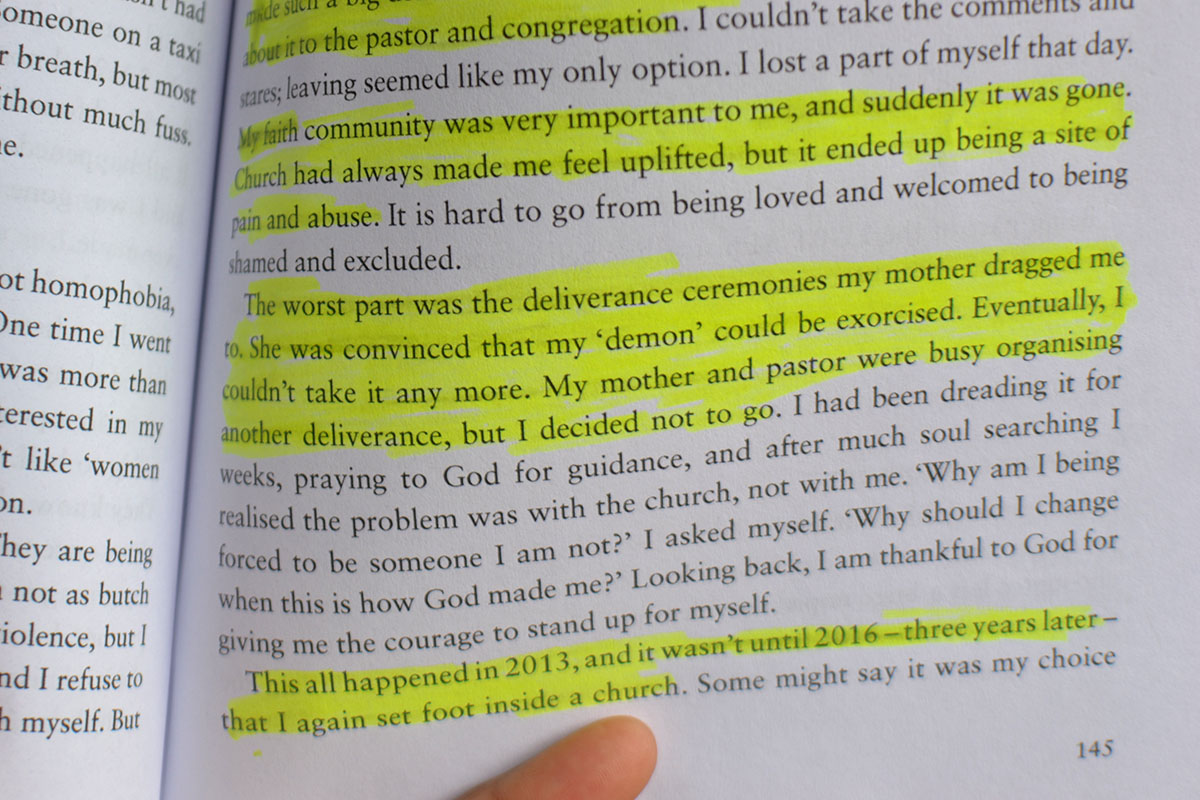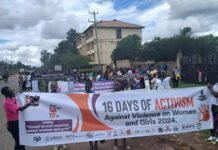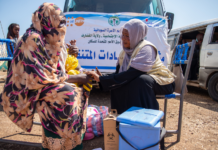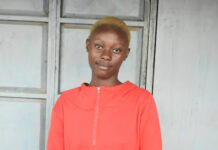
By Dianah Chiyangwa, Bongani Siziba and DeLovie Kwagala
Johannesburg, South Africa: Lerato Mokou, is a 23-year-old lesbian from KwaThema, East of Johannesburg. She has lived to tell the traumatic events in the hands of a man of the cloth.
Being a lesbian and growing up in a religious family was one of Lerato’s worst fears, especially with her grandmother, who by then, was a church leader.
“She grabbed me closer to her while I slid back on the chair and said I’m correcting you”, at that moment, my eyes were glued on the wall clock of the church, the ticking sound, diverted my thoughts and pain that I was enduring,” she said.
Mokou’s coming out journey was not received well by a person whom she trusted with invisible scars.
The agony in her voice reveals the suffocating pain that she has held for a long time, and as a church leader. Instead, it was the beginning of a painful journey that left her in affliction.
She continues to narrate a horrifying ordeal in 2010. “I was not only raped, but I also lost my virginity and I got infected with HIV by one of the church’s leaders”.
“He raped me by the altar, the same sacred space that is used as a platform by many religious leaders to attack homosexuals.” Lerato narrated as she tried to hold her tears back.

Similarly, a 31-year-old Zinhle Nkosi a lesbian from Zondi, Soweto recounted how she was mistreated by her own family member. “I was forced to wear a dress because church people need to see that I was a girl, and I was taken into a backroom, where some people were standing and some sitting. In the midst of all this, I was confused as to why prayers were specifically directed at me,”
Nkosi relates to how she was emotionally abused by her mother for almost two years and how she was forced to convert through exorcism by a pastor known to her mother.
“After the exorcism was performed on me, I decided to cut my mum out of my life completely. I went through depression, at some point I had suicidal thoughts because I was no longer at home and I was dealing with a lot of things alone,” said Nkosi.
Nkosi is currently doing her third year at UNISA, and at the same time focusing on her career as a chef and an events coordinator. This has helped Nkosi from dealing with her past experiences, and she is receiving a lot of support from her wife whom she got married to in 2021.

Conversion as a word was not widely used until a few years ago. According to Access Chapter 2, they decided to go beyond conversion as a therapy, because therapy means they are pathological issues that need to be investigated.
The idea of moving away from “therapy to practices” is because therapy limits itself from pathologizing the LGBTIQ+. They use “practices” to conceptualize all forms of conversions.
Access Chapter 2 is a non-governmental organization based in Pretoria, working in the space of protecting the human rights of women as well as the LGBTIQ+ communities. Funded by OutRight International, the organization is running a three-year project on conversion practices across the country, and recently, went across the country conducting a study lead by Professor Anthony Brown from the University of Johannesburg to conceptualize the understanding of conversion practices.
“One notable thing that came out of this study is the horrible experiences that LGBTIQ+ members were subjected to,” says Mpho Bontse, an associate responsible for running project conversion practices at Access Chapter 2.
Bontse said their findings and the data collected in the study reveal that families were the biggest perpetrators of conversion practices, followed by members of the communities, psychologists, religious and traditional healers.
In cases like Mokou’s, the study conducted by Access Chapter 2 revealed that 43% of the participants had a session with a religious representative, while 12% of the participants were subjected to corrective rape, and 19% revealed that religious leaders are perpetrators of conversion practices.
The study, also revealed that the impact of conversion practices had various psychological effects similar to what Mokou and Rev. Dhladhla were subjected to.
In Diepkloof, Soweto, we spoke to Reverend Nokuthula Dhladhla, founder of Ashes to Purpose, Global Interfaith Ambassador, who is also part of the Circle of Concern African Women Theologians, she shared her conversion practice journey that she was unaware of back then.
“It saddens me to realize that religious spaces are meant to be a safe space but it’s a place full of hatred and horrible experiences,” said Rev. Dhladhla.
After the church discovered that she was a lesbian, she was taken through prayers, embarrassment, and discrimination for six months.
After going through a horrible ordeal at the hands of religious leaders, Rev Dhladhla went through another excruciating and traumatic experience. She was raped.
“After the church found out was happened to me, they told me that it was a punishment from God, I was hurt because I thought I was going to get sympathy and I decided to take my own life” explained Rev. Dhladhla.
John Marnell, a senior researcher at the Africa Centre for Migration Society (Wits University), said that “These different methods are often presented in different ways, whether political, scientifically, religious, or culturally to promote a certain understanding of how humans should be and interact with each other, and more attention is needed to some these of practices because there are more widespread and dangerous than what we often think.”

A support structure is needed after going through a horrible experience, unfortunately for Mokou, it was a different case.
“After he finished raping me, he pointed a gun at me and threatened to kill me if I told anyone about what he had done,” said Mokou as she shakes her hands.
“Although the church was aware of what had happened, they never bothered to help me in any way, I decided to leave the church. My studies are keeping me busy, and I have moved on with my life. Nevertheless, I will never forget the pain caused cause by this pastor.” Mokou further narrated.
While there are different coping mechanisms to handle the effects of conversion practices, Rev. Dhladhla found solace in reading and understanding the bible, accepting herself, and having a connection with God.
Dhladhla then founded Ashes to Purpose, to give provide refuge for LGBTIQ+ communities who are not only subjected to conversion practices but are also facing a litany of social ills.
“Being present for LGBTIQ+ people who have been marginalized, stigmatized, and discriminated, is what my ministry is all about,” said Dhladhla.
She also stated that religious leaders are now open to dialogues that are meant to push towards the banning of conversion practices, and they are currently working on a project with Global Interface Network and Council of Churches within the SADC countries.
Although the study shows that -1%, of traditional representatives, are perpetrators of conversion practices, 7%, are victims who were forcefully had to consult traditional healers.
As we braved the scorching sun in Fourways, we were welcomed by the smell of imphepho (incense), which led us to Makhosi’s indumba (consulting room).
Sphamandla Gwala, a traditional healer and a consultant, also known as Makhosi or Gogo (a name that is used when greeting or referring to a certain traditional healer) ushered us into his tiny consulting room with mostly blue and red materials spread on the floor. On the other corner of the room was a shelf with traditional herbs and the other corner was burning candles.
In the palm of his hand, Makhosi holds a small tub while he feeds snuff with the other into his nose, drags it into his nasal cavity as his very life depends on it. Intermittently, he waves his ishoba, a ceremonial stick on both sides of his shoulders.
“African spirituality has no gender. As healers, we need to come together as one group where we provide people with therapy who are coming out as gay,” said Makhosi.
Makhosi expressed his concerns about traditional healers being perpetrators of conversion practices. He believes that being a healer is about moving from darkness into light, it delays the growth of the society as African people.
“Conversion practice is detrimental to the society, to one’s health. It’s killing society and destroying one’s self-esteem,” explained Makhosi.
Makhosi emphasized that traditional healers needed to be educated more about homosexuality. Further to that, religious leaders, traditional healers, psychologists, must unite and dialogue about spirituality and homosexuality to break down the effects that conversion practices have in society.

The study, also revealed that 49% of family members are perpetrators of conversion practices.
On the support structure, the study reveals that 21% sought help from LGBT Civil Society Organisations, and 57% from a friend.
Dr. Mmamonstheng “Dulcy” Rakumakoe, founder of Quadcare says they deal with cases mainly from transgender people who are often subjected to conversion practices.
“When they come to us, they are quite distressed and depressed and that’s when we bring in psychologists to help them deal with the trauma of different types of conversion practices.
Rakumakoe further said that the banning of conversion practices will come to an end when communities are more educated on sexual orientation and gender identity.
Commenting on the recent legislation that Canada passed to eradicate this harmful practice in late 2021, Iranti’s Director Jabu Parreira said: “It’s hugely welcoming with the way they stated the reasons for banning conversion therapy including in South Africa and across the world because it is also condemned by mental health practitioners such as psychologists across the world and it is regarded as a discriminatory and irregular practice.
The next step for Access Chapter 2, is to identify allies within policymaking spaces as an end goal to have legislation in the country that embraces and speaks directly to the banning of conversion practices in South Africa.
“This reporting was supported by the International Women’s Media Foundation’s Gender Justice Reporting Initiative.”













